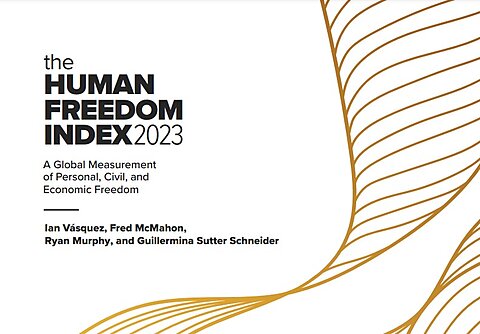
Ian Vásquez
Global freedom hit a high point in 2007, followed by a slow decline until 2019. That period coincided with the aftermath of the global financial crisis and the rise of authoritarian populism and other forms of illiberalism around the world. With the onset of the COVID-19 pandemic in 2020, freedom fell significantly and dropped to a slightly lower point in 2021. The decline affected 90 percent of the world’s population and set global freedom back more than two decades.
That’s the picture that the Human Freedom Index 2023, published today by the Cato Institute and the Fraser Institute, paints about the global evolution of personal, civil, and economic freedoms. The report uses eighty‐six distinct indicators across a range of freedoms for 165 jurisdictions for 2021, the most recent year for which internationally comparable data are available.
The United States ranks 17th on the index with its rating falling over time. In 2000, it ranked 7th. Not all countries deteriorated compared to 2000, the first year for which we have sufficient data. Taiwan (in 12th place) and Estonia (5th place) notably increased their level of freedom, for example.
As my coauthors Fred McMahon, Ryan Murphy, and Guillermina Sutter Schneider and I note, the contest between liberty and power has been ongoing for millennia. The report aims to help document that endless battle and to try to make sense of it in its current forms.
The tragic loss of freedom in Hong Kong—symbolized by the sham trial of Jimmy Lai that began there this week—is a dramatic example. As part of its crackdown on the traditional liberties of the territory, the Chinese regime has jailed the dissident billionaire for having advocated in favor of free expression and other basic rights.
The index captures Hong Kong’s fall. In the last decade and a half, only two other jurisdictions—Nicaragua and Syria—have lost more freedom than Hong Kong. As recently as 2010, Hong Kong held 3rd place. It has plummeted to forty‐six, with pronounced declines in the rule of law, freedom of expression, and freedom of association and assembly.
It now ranks 146th in freedom of assembly and association. Given the large deterioration in Hong Kong’s personal and civil freedoms and given the strong relationship we generally find between personal and economic freedom, we should expect further declines in Hong Kong’s economic liberties as well.
Another dramatic example is Argentina. Over the past twenty years of mostly populist‐Peronist rule, Argentina’s level of freedom steadily declined, and its ranking fell from forty‐one in 2000 to seventy‐seven in the current report. But it was in terms of economic freedom that the country saw a complete collapse—falling from a ranking of 40th in 2000 to 158th in the new index. We should not be surprised by the disastrous economic results or by the rise of a libertarian Javier Milei as president.
The index reports many more findings and presents a wealth of information. Explore the levels of freedom in your country, the relationship between various freedoms and prosperity, regional freedom differences, the level of women’s freedoms, the distribution of freedom around the world, and much more here.





